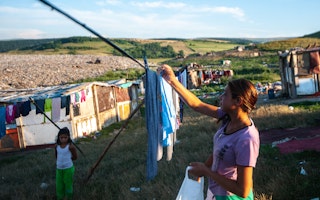The Rise of the Far Right and Anti-Gypsyism in Hungary
By Bernard Rorke
Open Society Institute Roma Initiatives Fellow Szilvia Varró, a journalist with the Hungarian weekly Magyar Narancs, was recently awarded the 2010 Joseph Pulitzer Memorial Prize for investigative journalism. Varró published a series of articles about the wave of gun and bomb attacks on Roma settlements that left six dead and many wounded. She has also extensively covered the rise of the right-wing extremist Jobbik party. She spoke recently with Bernard Rorke of OSI.
Jobbik is trying to remold itself as a radical rather than fascist party. How would you categorize Jobbik?
Jobbik is an openly anti-Semitic and racist party which uses populist ideas borrowed from left and right, covered with a strong hatred of Jews and Roma. They successfully manipulated a widespread and growing fear of crime, which Jobbik links to the Roma.
But Jobbik’s success cannot be described adequately in ethnic terms. During the European Parliamentary elections many young people voted for the party. A substantial section of the Hungarian population is fed up with mainstream political parties, wants law and order, and no Gypsies. Jobbik became a protest party which could attract the votes of people disenchanted with politics, who view the political class as distant and incompetent.
Hungarian society was sensitive to corruption before the global financial crisis, but the meltdown made ordinary people particularly sensitive. Under these conditions the extreme right has been and is able to exploit the political vacuum with its quasi- fascist demagogy.
Jobbik is the wunderkind of the European extreme-right scene. With its combination of successful use of new media and communications, its radical and forthright language, and the conscious grassroots mobilization and structure of the party, it was able to connect with the younger generation. In part, Jobbik owes its success to the impotent socialist-liberal government which has been in power for eight years, but failed to dissolve the Roma ghettos; failed to address poverty; and did nothing to help the multiply disadvantaged impoverished micro-regions.
Attention to anti-Gypsyism in Hungary has abated since the wave of serial killings ended. How high is the level of prejudice against Roma now? Based on your direct contact with Roma communities, is there still a climate of fear and intimidation?
Due to the overall decline in living standards, Roma became one of the main targets of increasing intolerance. Although the banned Hungarian Guard, the paramilitary wing of Jobbik, is no longer marching through Roma ghettos, Roma still expect them at any time. Even if there are no more deadly attack against Roma in Hungary, no one can wipe what has happened over the last two years from the collective memory of the Hungarian Roma.
The message was clear, and clearly understood: even if you’re a hard-working student, even if you hold a high position, and have become an integral part of the Hungarian society—if you are Roma you can be shot down in your bed like a dog. Roma remain traumatized in Hungary; not even the relatives of those Roma who were attacked and murdered receive any assistance from the Hungarian state to cope with their trauma and tragedy.
***
The following excerpts are English translations of two of Varró’s articles, samples of her award-winning work published in Magyar Narancs:
"The Sixth: 'Close the Door after Mom,'" August 6, 2009
Mária Balog is the sixth victim of a series of assaults on Roma people that began in 2008… the police admitted that the incident was related to the previous killings, and raised the reward for information to a record 100 million Hungarian forints.
“My mom is feeling dizzy in her room, my mom is feeling dizzy in her room,” 13-year-old Ketrin shouted to her aunt Gizella Balog as she approached the house. The garden gate was undamaged, but the front door was smashed in, and the door-post bore the marks of shotgun blasts. Inside, Gizella was met by the young girl her T-shirt and shorts heavily bloodstained. She had dried blood on her neck, her mouth was swollen, her face was pale and puffy; she was standing in a state of shock in a room in the right wing of the little house. Gizella spotted five wounds on the little girl’s arm. She asked her niece what happened. The little girl replied: “The door just slammed shut, this is why everything is covered with blood.”
"Hairline Cracks: Scrambling for Power within Jobbik," February 4, 2010
Electoral success comes at a price for the Hungarian far right. Jobbik has angered and alienated some of its emblematic and hitherto loyal members in the selection processes for the European Parliament elections in 2009 and the impending general election. Several party members who opposed the central committee have been expelled … Jobbik is eager to capitalize on the gains made last year in the European Parliament elections, where they polled an unparalleled and unanticipated 15% and sent three MEPs to Brussels. In the run-up to the forthcoming general election, Jobbik candidates have been instructed to moderate their rhetoric and refrain from overt and gratuitous anti-Semitic and anti-Roma outbursts for the duration of the campaign.
Until December 2013, Bernard Rorke was international research and advocacy director for the Roma Initiatives Office.


